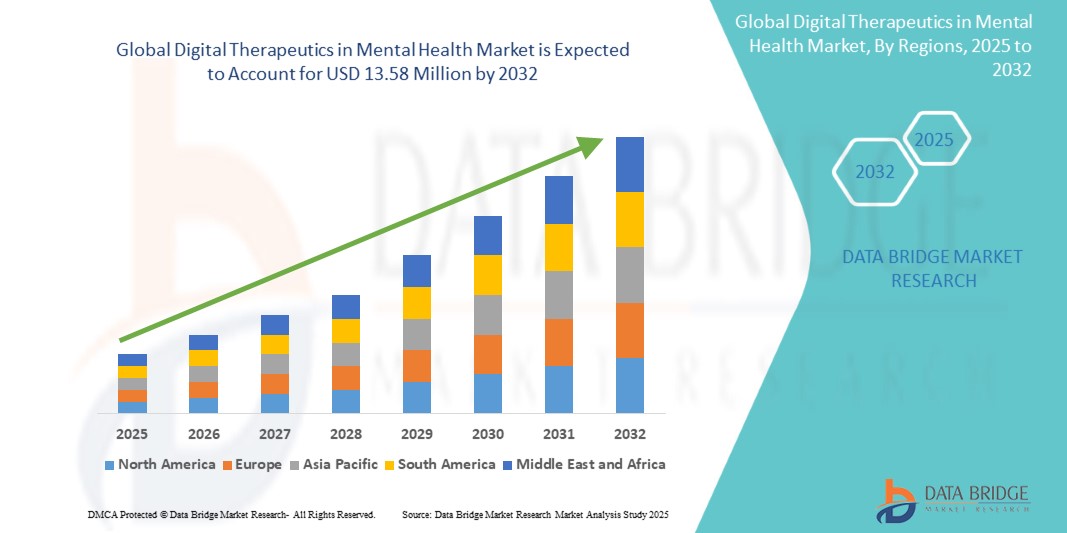Digital Therapeutics in Mental Health: A Patient’s Guide to Getting Started
The Digital Therapeutics in Mental Health market was valued at USD 3.03 Billion in 2024 and is expected to reach...

Introduction
In recent years, the field of mental health care has seen remarkable advancements with the integration of technology. One of the most promising innovations is digital therapeutics, which harness technology to deliver evidence-based mental health interventions. For many patients, navigating the world of digital therapeutics can seem daunting. This guide aims to simplify the journey, providing insights into what digital therapeutics are, their benefits, and how to get started.
Definition
Digital Therapeutics in Mental Health refers to evidence-based therapeutic interventions delivered through digital platforms, such as apps, software, or online tools, designed to prevent, manage, or treat mental health conditions. These solutions often leverage behavioral science, cognitive therapies, and data-driven insights to provide personalized support, monitor progress, and enhance patient engagement. Examples include tools for managing anxiety, depression, or stress, often used as standalone treatments or in combination with traditional therapies, offering accessible and scalable options for mental health care.
What Are Digital Therapeutics?
Digital therapeutics (DTx) refer to software-based treatments that leverage technology to prevent, manage, or treat medical conditions, including mental health disorders. Unlike general wellness apps, DTx are rigorously tested and backed by clinical evidence to ensure efficacy and safety. They often complement traditional mental health treatments, such as therapy or medication, and may be prescribed by healthcare providers.
Examples of mental health-focused digital therapeutics include:
- Cognitive Behavioral Therapy (CBT) Apps: Programs designed to help patients manage negative thought patterns and behaviors.
- Mindfulness and Stress Reduction Platforms: Tools that guide users through meditation and relaxation techniques.
- Mood Tracking and Feedback Systems: Applications that monitor emotional states and provide actionable insights.
- Virtual Reality (VR) Exposure Therapy: Software that uses immersive environments to help individuals confront and overcome phobias or trauma.
Benefits of Digital Therapeutics for Mental Health
Accessibility:
Digital therapeutics break down barriers to mental health care by offering interventions that can be accessed anytime and anywhere. This is particularly beneficial for individuals in rural or underserved areas where mental health professionals may be scarce.
Personalization:
Many DTx platforms use algorithms and patient input to tailor interventions to an individual’s specific needs. The efficacy of treatment is increased by this personalised approach.
Cost-Effectiveness:
Compared to in-person therapy sessions or prolonged hospital stays, digital therapeutics often present a more affordable option. Some platforms even offer free or subsidized access for those in need.
Stigma Reduction:
For individuals hesitant to seek traditional therapy due to stigma, digital therapeutics provide a discreet and private alternative.
Data-Driven Insights:
By tracking user interactions and progress, DTx platforms can provide real-time feedback to patients and clinicians, ensuring that interventions remain effective and adaptive over time.
How to Get Started with Digital Therapeutics
Embarking on the journey with digital therapeutics involves several steps to ensure you choose the right tools and maximize their benefits.
Assess Your Needs:
Before exploring available options, take time to understand your mental health challenges and goals. Are you dealing with anxiety, depression, or stress? Do you need help with sleep, focus, or mood regulation? Having a clear understanding of your needs will guide you toward the most appropriate solution.
Consult a Healthcare Professional:
While many digital therapeutics are accessible without a prescription, consulting a healthcare provider is highly recommended. They can:
- Help diagnose your condition.
- Recommend evidence-based digital therapeutic tools.
- Track your development and adjust your treatment strategy as necessary.
Research Available Options:
Not all mental health apps are created equal. Look for DTx platforms that:
- Have received regulatory approval (e.g., FDA approval in the U.S.).
- Are supported by clinical trials or peer-reviewed research.
- Offer features aligned with your specific mental health needs.
- Have positive reviews and testimonials from users.
Popular digital therapeutics for mental health include:
- Woebot Health: A chatbot that provides CBT techniques and emotional support.
- Headspace Health: A mindfulness app with meditation exercises and stress-reduction tools.
- reSET-O: FDA-approved for substance use disorder.
- Big Health’s Sleepio and Daylight: Programs addressing insomnia and anxiety.
Set Realistic Expectations:
Digital therapeutics are not a quick fix. They require time, commitment, and active participation to yield results. Set realistic goals and understand that progress may be gradual.
Ensure Data Privacy and Security:
Mental health data is sensitive, making it crucial to choose platforms with robust privacy measures. Check for:
- Encryption protocols.
- Compliance with regulations like HIPAA or GDPR.
- Transparent data usage policies.
Integrating Digital Therapeutics into Your Routine
Consistency is key to the success of digital therapeutics. Here are some tips for making them a regular part of your mental health care routine:
- Schedule Regular Check-Ins: Set aside specific times each day or week to engage with the app or platform.
- Track Your Progress: Use built-in tools to monitor changes in mood, behavior, or symptoms over time.
- Combine with Traditional Therapies: Digital therapeutics often work best when used alongside in-person therapy or medication.
- Seek Support: Join online communities or forums associated with your chosen platform for encouragement and shared experiences.
Potential Challenges and How to Overcome Them
While digital therapeutics offer significant advantages, they’re not without challenges. Effectively navigating possible difficulties can be facilitated by being aware of them:
Technology Barriers:
Not everyone is tech-savvy or has access to reliable devices and internet connections. Solutions include:
- Using user-friendly platforms with intuitive interfaces.
- Accessing community resources or libraries for internet access.
Lack of Motivation:
Staying committed to a new therapeutic approach can be challenging. Boost your motivation by:
- Setting reminders.
- Celebrating small milestones.
- Seeking accountability partners.
Limited Human Interaction:
Some individuals may miss the personal connection of face-to-face therapy. To address this:
- Choose platforms that offer live support or therapist involvement.
- Use digital therapeutics as a supplement rather than a replacement for in-person care.
Future Prospects for Digital Therapeutics in Mental Health
The landscape of digital therapeutics is rapidly evolving. Emerging trends include:
- Artificial Intelligence (AI): Enhancing personalization and predictive analytics.
- Virtual Reality (VR): Expanding immersive therapies for PTSD, anxiety, and phobias.
- Wearable Integration: Linking DTx with wearable devices to track physiological indicators like heart rate and sleep patterns.
- Greater Accessibility: Efforts to bridge the digital divide and make these tools available to underserved populations.
Growth Rate of Digital Therapeutics in Mental Health Market
The size of the global market for digital therapeutics in mental health was estimated at USD 3.03 billion in 2024 and is expected to grow at a compound annual growth rate (CAGR) of 20.60% from 2025 to 2032, reaching USD 13.58 billion.
Read More: https://www.databridgemarketresearch.com/reports/global-digital-therapeutics-in-mental-health-market
Conclusion
Digital therapeutics represent a groundbreaking approach to mental health care, offering accessibility, personalization, and data-driven insights. By understanding your needs, consulting healthcare professionals, and committing to regular use, you can unlock the potential of these tools to improve your mental well-being. While challenges exist, the benefits far outweigh the drawbacks, making digital therapeutics an invaluable addition to the modern mental health landscape. Start your journey today and take a step toward a healthier, more balanced life.






